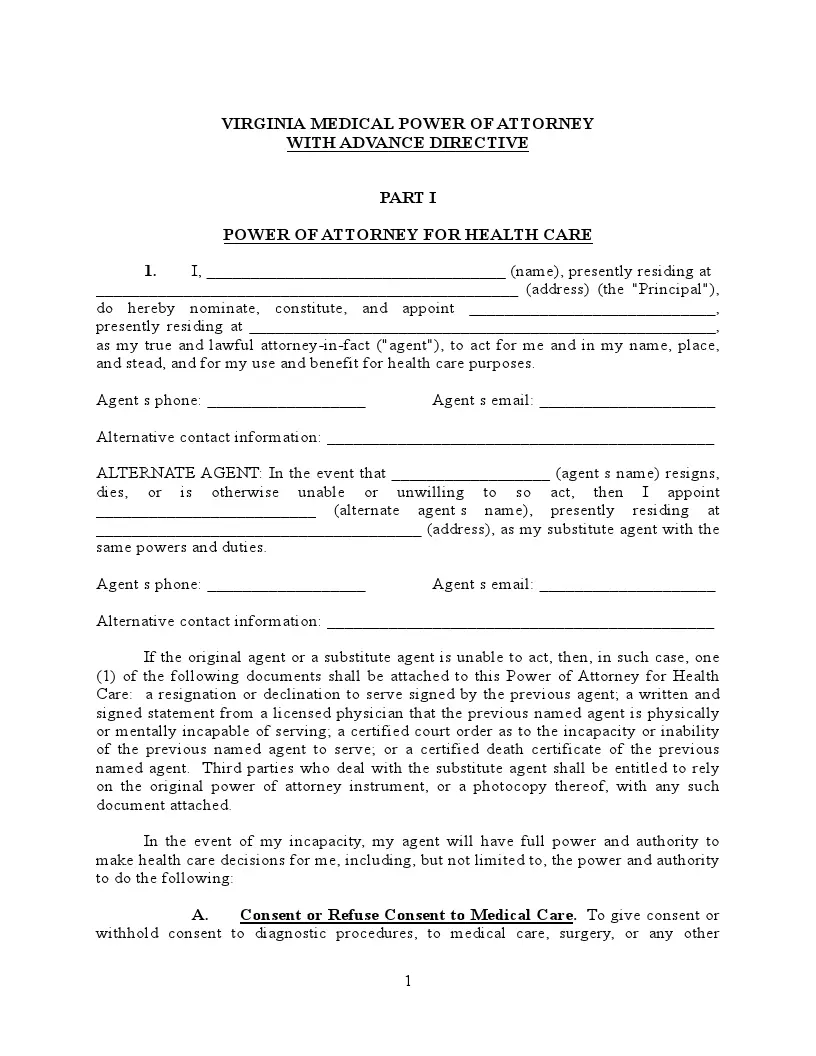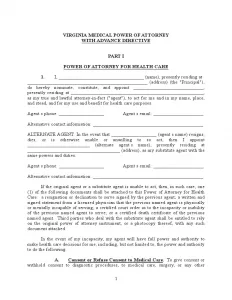Virginia Medical Power of Attorney (POA) Form
With the Virginia Health Care Advance Directive, you will be able to assign a person you trust the most to be your legal guardian and representative in all matters concerning your health in situations, when you will not be able to make a decision yourself. It is always better to assign an attorney for urgent health matters beforehand, as you never know what the future holds. Try to stay realistic on this and, if you consider yourself a forward-thinking person, ensure to sign the medical power of attorney form.
Only choose reliable people to be your healthcare attorney, as sometimes, your life can depend on them quite literally. The attorney gets to make the final decision in terms of treatment, its duration period and termination. Keep in mind that this person may happen to have the last say in case of a potential life support termination. Situations can be very different, and the healthcare attorney will get to decide explicitly in cases when the principal is recognized incapacitated. Yet, remember that this is the person you are trusting your fate with and treat this issue seriously.
Virginia power of attorney templates – have a look at some other powers of attorney used in the State of Virginia.

Build Your Document
Answer a few simple questions to make your document in minutes
Save and Print
Save progress and finish on any device, download and print anytime
Sign and Use
Your valid, lawyer-approved document is ready
With all that said, you shall provide detailed instructions for your designated legal agent so that they could act in your best interests. Those instructions and guidelines may cover a range of issues, such as Medicare programs participation, preferable treatment, organ donation; one may even add a written wish to be cremated in case of sudden death and many other peculiarities.
There is no unified sample of such a Directive in the US. Each state has its own laws and recommendations that regulate the creation of this form. Some states require notarization of the MPOA form; in others, you will need to call a witness (or two) to sign the papers.
Virginia Laws and Requirements
As stated in Section §54.1-2983 of the Virginia State Law, signing a form should be accompanied by two witnesses. You should be over 18 (or under this age but have the rights of an adult) and in sound mind.
You are to choose the future agent very carefully because one will make medical decisions for you. An agent can be any adult except for one from the medical staff of the hospital where you get treatment. But if at the same time one is your relative, then one can be.
Under Virginia law, the signatures of you and other people involved should be written. After the signing process, an agent gets access to all your medical records for understanding what the right decision one must make on your behalf.
In Virginia, you (as a declarant) may add two agents (principal and additional) in your health advance directive form.
Virginia Medical Power of Attorney Form Details
| Document Name | Virginia Medical Power of Attorney Form |
| State Form Name | Virginia Advance Medical Directive |
| State Laws | Virginia Code, Sections 54.1-2981 to 54.1-2993.1 |
| Signing Requirements | Two Witnesses |
| Who Can’t Be the Agent? | Person under the age of 18 |
| Who Can’t Be the Witness? | Person under the age of 18 |
| Avg. Time to Fill Out | 8 minutes |
| # of Fillable Fields | 21 |
| Available Formats | Adobe PDF |
Popular Local Medical POA Forms
MPOA forms are used in each and every state. Check some other printable MPOA forms frequently completed by people.
Filling Out the Form
You do need to download a relevant Virginia Health Care Advance Directive template before proceeding to fill it out. But instead of searching all through the web, we suggest you use our software developments and create a customized legal form. There is also a PDF online editor available to fill it out electronically.
1. Download the Relevant Form Template
Once you get the currently used form template, you may start to fill it out by inserting your personal data. See below what this data includes in particular.
2. Enter the Patient’s Personal Data
In this part of the form, you (or the legal guardian) shall enter all data related to the subject declarant. This data includes their full legal name, factual residence address, contact info (it is essential to provide an emergency contact for managing crisis situations).

3. Choose Your Designated Agent
After providing the patient’s personal details, you may proceed to designate your healthcare agent. You will have to identify their personality and supply personal info, including name, physical address, all kinds of contacts, and an effective mailing address. It is best to ask for and indicate the daytime and emergency contact number as well.

4. Decide on an Additional Agent
In Virginia, you are allowed to appoint one additional healthcare agent. The legal procedure is the same for all designated agents, and all of them have an equal share of personal authority to decide on the patient’s healthcare matters.
There is some additional blank space right below the info on your first designated agent, so you may use that to repeat the procedure and provide respective data in the corresponding boxes regarding the second agent. The second agent, in turn, will be able to act on the patient’s behalf if, for some reason, the first agent becomes disabled or incapacitated.

5. Fill out the Instructions for Your Agent
You are free to set forth almost any instruction you want for your designated agent. But, of course, you need to stay reasonable and comply with the state law. There is a list of pre-chosen potential instructions in the form already, but if you do not agree with them, you may cross them out and write some of your own.

6. Provide Special Conditions (if any)
In the blank field of the next section, you may also add some instructions that can limit or increase the responsibilities of your agent.

7. Insert the Life-Sustaining Therapy Preferences
The document’s second section is divided into three primary parts. Each part, basically, contains specific info regarding certain medical procedures and health-related crisis management. The patient should describe their respective preferences that will serve as clear guidelines for the designated agent in the future. Make sure that your personal medical preferences do not contradict the instructions for the agent you have prescribed above.

8. Specify the Info about Organ Donation
In the third section, you can choose whether you want to donate your organs or not (and which particularly). Check only one box that is the most preferable for you. The next blank lines are for your additional preferences that are not mentioned by the authors.

9. Sign the Health Care Advance Form
You, as a declarant, must check the information you have provided several times and then sign the document and add the relevant date. If you are physically unable to do it, appoint a representative to sign the paper on your behalf.

10. Ask Two Witnesses to Sign
Two witnesses should sign and add the relevant data. Remember that none of your witnesses can act as your designated healthcare agent.


We provide a range of major Virginia documents to anybody looking for simplicity when handling various papers.
Download a Free Virginia Medical Power of Attorney Form
